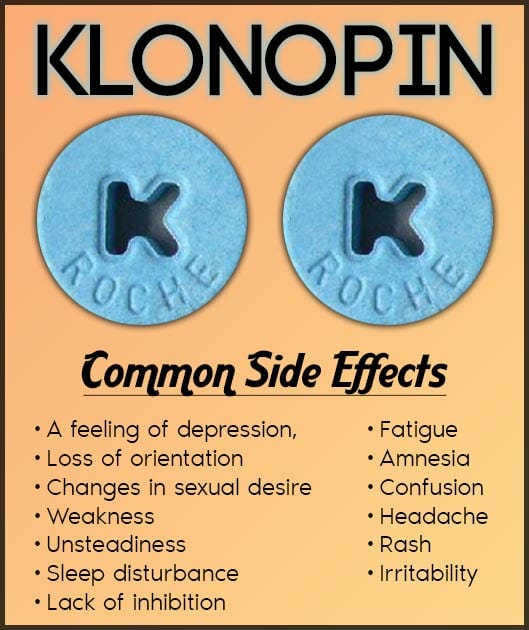One of the most popular treatments of panic disorder is Klonopin. But, the risk of Klonopin addiction is also a very real thing. Like an opioid dependence, Klonopin can be hard to kick.
According to some estimates, almost 2 million Americans suffer from panic disorder. This condition causes panic attacks during everyday activities.
Panic attacks can feel like a heart attack. Symptoms include trouble breathing and heart palpitations. They can stop you dead in your tracks. These attacks can be very frightening. The possibility of having one can keep many patients holed up in their houses.
Agoraphobia, the fear of going outside, is one of the worst side effects of panic disorder. The isolation makes the anxiety worse. A combination of medication and psychotherapy can treat these disorders.
Here we discuss the risk factors of taking Klonopin. We will go over some signs and symptoms of Klonopin abuse. We will also provide some treatment options for a Klonopin addiction.
Klonopin: Risk Factors, Symptoms, and Treatment
Clonazepam, the scientific name for Klonopin, is a benzodiazepine. These medications are not only prescribed for panic disorder. They treat seizures, trouble sleeping, and other issues as well.
The Food and Drug Administration (FDA) approved it in 1975. The Roche drug company named it Klonopin and were the first to manufacture it. Today, many different companies manufacture generic versions of the medication.
The drug has become a popular treatment for different anxiety disorders. Its efficacy in treating panic is second to none. But, the drawback is, it’s very easy to slip into Klonopin addiction. Let’s take a closer look.
What is Klonopin and is Klonopin addictive?
Benzodiazepines work by replacing faulty neurotransmitters in the brain. They replace the neurons responsible for relaxation and stress management. Any medication that has an effect on brain chemistry comes with a risk of dependence.
Replacing these faulty receptors causes a decrease in anxiety levels. The brain likes outsourcing its work through. So, the brain, sometimes in as little as two weeks, stops producing any of its own receptors.
Once the brain stops production you’ve become dependent on the drug. Missing a dose could mean worse anxiety than ever before.
Clonazepam is a controlled substance. A controlled substance has a higher chance of causing addiction. These substances need extra precautions.
Doctors can only use handwritten prescriptions for controlled substances. In most cases, they cannot provide refills. You will need to check in with your doctor every time you need more medicine.
The Risk Factors of Klonopin Use

Clonazepam can increase suicidal thoughts. It can make depression and anxiety worse in some patients. But, make sure you see your doctor before you stop taking it.
Trying to stop taking a drug your brain is dependent on is dangerous alone. Klonopin withdrawal is a serious situation. Before stopping this medication you should seek medical supervision.
Some issues as mild as nausea and as complicated as seizures or heart problems can happen. Having a doctor on hand can help you detox in a safe way. They can handle any complication that comes up.
Signs and Symptoms of Klonopin Addiction
Some of the most common signs of an addiction to Klonopin are:
- Loss of interest in activities you once found enjoyable
- Developing sudden financial or legal issues that seem out of character
- Near constant cravings for the drug
- Experiencing negative side effects but continuing to use anyway
- Wanting to quit but being unable to do so without getting sick
Addiction can look different for everyone. Pay attention to the people around you. Have they stopped doing things they love? Are they different somehow?
Are you having reactions to things that wouldn’t set you off before? Can you not explain your behavior?
If you or your loved one seems to be suffering from a dependency on Klonopin, take action ASAP. Getting into treatment right away can be your best course of action.
While stopping the medicine would seem to be a logical first step, don’t do it on your own. The severity of the withdrawal is a real concern. Make sure you or your loved one are under proper medical supervision before the detox starts.
How to Seek Treatment and Recovery from Klonopin Addiction
Do not attempt to stop Klonopin on your own. As we have discussed, withdrawal from this medication is no joke. You want to be under medical supervision, in a safe place, and have staff on hand to assist should anything go wrong.
Your best bet is to seek a professional recovery center to kick your habit. An inpatient drug rehabilitation program can offer a more supportive withdrawal process.
Inpatient programs also offer support and therapy once coming out of physical withdrawal. They can also provide tools to maintain success in your recovery in the future.
While this may seem out of reach a lot of insurance companies are starting to cover these services. You can verify your insurance beforehand to see if they will cover your recovery. Worrying about bills is the last thing you need while trying to get well.
Weigh the Risks and Benefits Before Starting Any Medication
At the end of the day, you have to know yourself and your body before seeking any kind of medication. Anxiety disorders are the most common mental health problem in the US. If you suffer from panic attacks, anxiety, seizures, or other ailments seek help.
Ask questions about any medication your doctor suggests. What does it do? Is it addictive? Are there other treatments to try before we go for a controlled substance?
Are you concerned that you or a loved one has developed a Klonopin addiction? Don’t know where to turn? We are here for you.
Local to Los Angeles, CA? Contact our facility here and we are happy to help you take the next step. Here at REVIVE Detox, you can experience addiction recovery on a whole new level.Most PPO Health
